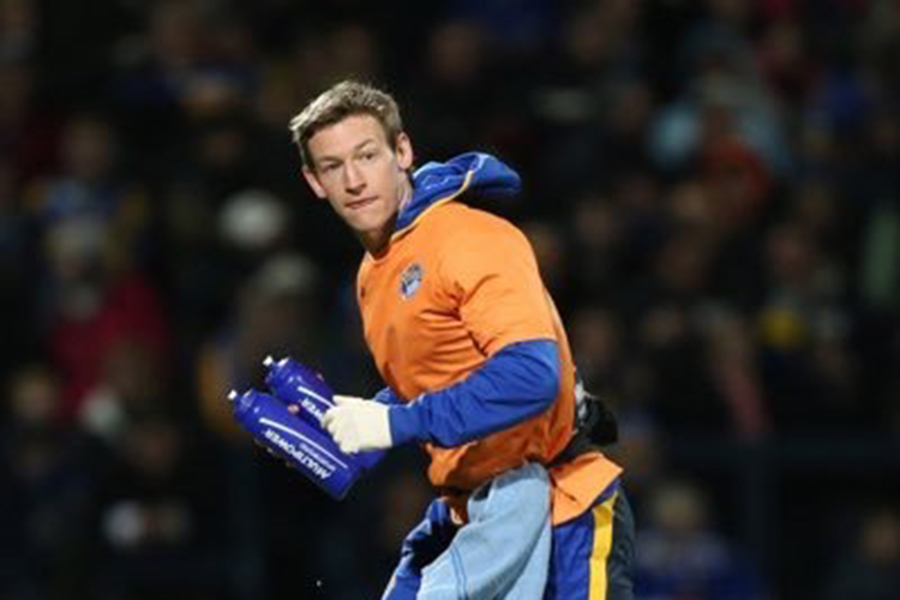
Sports physio Andy Barker
Andy Barker is a Chartered Physiotherapist and Biomechanist currently working as the Head Physiotherapist at Leeds Rhinos. Here, he shares his top tips…
#1 Showcase Your EGO!
Trying to establish a career as a sports physio there was a need to showcase yourself and make yourself stand out from the crowd.
If I was to put the last ten CV’s and letter of applications that I received side by side, I reckon 75% of the content in each one is the same. Being punctual, having a smart appearance and being enthusiastic are pre-requisites; not just for a job in professional sport but for most other professions. Without these it’s unlikely you will succeed in having a long and successful career working in professional sport. Turning up late to training will not only lose you the respect of your peers and players it’ll almost also be a one-way ticket to your P45. So given these skills are pre-requisites, it’s unnecessary to include them in your approach.
What we want to know is something about YOU that makes you different and/or better than the other candidates applying for the same opportunity or job….
To do this, don’t hold back and go hard explaining your strengths. We all have something that we are good at, or something good we have achieved or something we are particularly proud of. Getting this information across is key. It gives an insight into YOU, what you’re about, your background and what you’ve done and achieved.
So how do you do this……..
My biggest tip is to try to highlight something that will grab the reader’s attention and is going to likely stick in their head. This makes you stand out and also is a potential topic of conversation should you make the interview stage.
#2 Don’t Ask For A Job
Well not straight away………
Making contact with a professional sport setting is one of the biggest obstacles you will face during your quest for an opportunity or job within professional sport. Once you have found the relevant contact details for your intended request and your method of contact (phone, letter, email) you’re ready to go.
What you say in this initial contact could be the making or breaking of you getting a shot in sport, be it a placement, shadowing experience or even a job. Therefore, nailing this initial contact is so important.
However, this is the biggest thing that I see done so poorly. People absolutely butcher their initial contact with professionals like myself and others working in professional sport. As such your chances of entering professional sport are dead and buried.
As a general rule, I would never ask for a placement, shadowing opportunity or paid employment straight away. Ideally a least five emails would be exchanged before you would ask. Those initial emails are aimed at building rapport and a relationship with your intended gatekeeper.
One fundamental component needed to do this well is doing your research; both around the intended team/sport and mainly the person you are contacting. A simple Google search or a search of the club or organisation that professional works at with will often do the trick.
The aim of the game is to build a conversation. Hopefully the information you have attained will enable you to establish the career path, previous and co-existing work experiences and any other domains that professional might be involved with.
#3 Don’t Lie
Seems an obvious point but you’d be surprised at how many people do tell a few tales in their quest to get a job in professional sport. Sport is a hard nut to crack and to gain entry is very difficult. Those that work in sport are quite a closeknit group and you don’t have to go too far to know someone that knows someone and so on. Therefore, it’s not hard to gain information about a possible future employee should that be necessary.
Therefore, if you say you have ‘worked’ somewhere, make sure you have. I have spoken to other professionals working at other clubs where applicants have claimed they have ‘worked’ at that club however, they never have. Equally other professionals have contacted me asking about interview candidates who claimed they had ‘worked’ alongside me, however, they never had. Needless to say, none of these people got a job.
#4 Learn How To Write
And I’m not talking about grammar here but instead how you structure your content when you request an opportunity within professional sport.
Whether it’s an email or letter of application the same rules apply. First and foremost, ensure you apply Step #3 and DON’T in any circumstances ask for a job in that initial contact. A minimum of five emails is a good marker to use before you should even think about doing so.
Beyond that, how you structure your dialogue and what you include in your text is vitally important. I’ve highlighted a couple of the most common mistakes that I see frequently that you should avoid like the plague if you want a job in professional sport.
DO NOT start with Dear Sir/Madam or something similar
For me this screams ‘I couldn’t be bothered to spend 2 minutes looking on your clubs website to find your name, so I just put Sir/Madam instead.’
Get to the POINT………
Those that work in sport will know that it’s a full-on job and some days you don’t get the time to scratch your own backside never mind anything else. If your email happens to drop in your intended readers inbox on one of these days it’s unlikely to get read well if its five pages and 2000 words long.
#5 Get Help
I don’t think anybody achieves great success in any domain without help from others. Working in sport is no different.
I have been privileged to work with some great staff during my time in sport, in a variety of different professions. During my early career at the Leeds Rhinos I worked under the then head physio David O’Sullivan and learned so much from him, both clinical and non-clinical content.
More recently working alongside Martin Higgins, both in a sporting and non-sporting setting has also massively helped and in particular gave me the knowledge and skills to set up my own clinic.
Without the expertise and mentorship of these two I very doubt that I would be where I am now. I still rely on them both for help when needed, whether that’s a tricky patient or player or advise with how to keep building my clinic.
By making use of other people you can use their knowledge and advice to ensure you don’t make the same the mistakes they made. On reflection, we all would have done things differently at different time points in our lives.
Website
RehabRoom is brought to you by sports physio Andy Barker, Chartered Physiotherapist and Biomechanist, currently working as the Head Physiotherapist at Leeds Rhinos.
Related Profile
Tracy Lewis, Head of Physiotherapy, for the Football Association provides an overview of her role of sports physio
Interested in becoming a sports physio? The role of sports physio is just one of the many career profiles highlighted in our Careers in Sports Science and Careers in Football section of our website.

